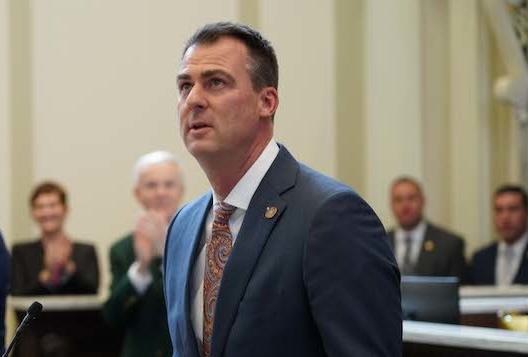
Law & Principles
Stitt signs legislation allowing police to arrest illegal immigrants
Ray Carter | May 1, 2024
Gov. Kevin Stitt has signed into law a bill making “impermissible occupation” a crime, allowing law enforcement officials to arrest illegal immigrants.
“I am disappointed this bill is necessary,” Stitt said. “Since President Biden took office in 2021, more than 10 million people have poured over the southern border. Countless individuals from across the globe, including thousands of Chinese nationals as well as people affiliated with terror organizations, have illegally crossed the U.S.-Mexico border. Oklahomans are concerned by who could be lying in wait for an opportunity to bring harm to our country.”
House Bill 4156, by House Speaker Charles McCall and Senate President Pro Tempore Greg Treat, creates the crime of impermissible occupation, which is defined as occurring when a person willfully and without permission enters and remains in the state of Oklahoma without having first obtained legal authorization to enter the United States.
The legislation declares that throughout the state “law enforcement comes into daily and increasingly frequent contact with foreign nationals who entered the country illegally or who remain here illegally,” including those involved with “illegal marijuana grow operations, which have exploded in number in recent years,” “organized crime such as drug cartels,” and individuals involved in “fentanyl distribution, sex trafficking, and labor trafficking.”
Under the bill, a first offense would be a misdemeanor punishable by up to one year in jail and/or a fine of up to $500, and the individual would be required to leave the state within 72 hours of release from custody and prohibited from reentering Oklahoma thereafter.
A second or subsequent offense would be a felony punishable by up to two years in prison and/or a fine of up to $1,000, as well as being kicked out of the state.
The legislation also includes a preemption clause prohibiting municipalities from becoming “sanctuary cities.”
Because the bill passed with an emergency clause, HB 4156 became effective when the governor signed it.
HB 4156 passed by overwhelming margins in both chambers of the Oklahoma Legislature, but was vocally opposed by Democrats, who continued to criticize the bill after Stitt signed it.
“Over the past two weeks, many Oklahomans have felt anxious about HB 4156,” said state Sen. Michael Brooks, an Oklahoma City Democrat who chairs the Oklahoma Legislative Latino Caucus. “Our caucus has done our best to quell fear and address questions at various town hall meetings from Oklahoma City to Tulsa. It has been abundantly clear that folks across the state understand what is at stake—profound loss of revenue and workforce, strain on law enforcement, and expensive legal challenges. We have said from the very beginning that there are common sense policy solutions that we should be discussing, and I am disappointed that the governor chose not to revisit that conversation.”
State Rep. Annie Menz, D-Norman, predicted that because of HB 4156’s passage “a lot of good, hard-working people will leave Oklahoma.”
House Democratic leadership separately issued a release calling HB 4156 one of the “most strict” immigration laws in the nation.
House Democratic Leader Cyndi Munson, D-Oklahoma City, called the bill “dangerous and scary” as well as “hateful policy that does nothing to protect Oklahomans or bolster our workforce.”
Stitt noted the concerns of legal immigrants in a press release and announced that he is launching a task force to work on policies that will support legal immigration. In his executive order creating the task force, Stitt wrote, “I have been clear that House Bill 4156 is not aimed at the honest, hardworking Hispanic or other international migrant populations here chasing the American dream, enhancing our communities, economies, and way of life, and otherwise significantly contributing to Oklahoma’s tapestry.”
He emphasized those points in a release announcing that he had signed HB 4156 into law.
“My sole aim is to protect all four million Oklahomans, regardless of race, ethnicity, or heritage,” Stitt said. “I love Oklahoma’s Hispanic community and I want to ensure that every law-abiding citizen has the opportunity to pursue the American Dream. Let me be clear—there is no tolerance for racism or discrimination against any community in our state. I want our Hispanic community to rest assured that this law does not give law enforcement the authority to profile individuals or question them about their immigration status without reasonable suspicion of a crime.
“Furthermore, this is an opportunity for our state to continue to find solutions where the federal government has failed,” Stitt continued. “That is why I am launching the Oklahoma State Work Permits and Visas (OSWPV) Task Force to find ways to bolster our workforce and create opportunities for those who are here contributing to our communities and economy. As I’ve said many times, governors should have more authority over the H1-B visa process so we can better address the workforce needs of our economies. This task force will be a step in that direction.”

Ray Carter
Director, Center for Independent Journalism
Ray Carter is the director of OCPA’s Center for Independent Journalism. He has two decades of experience in journalism and communications. He previously served as senior Capitol reporter for The Journal Record, media director for the Oklahoma House of Representatives, and chief editorial writer at The Oklahoman. As a reporter for The Journal Record, Carter received 12 Carl Rogan Awards in four years—including awards for investigative reporting, general news reporting, feature writing, spot news reporting, business reporting, and sports reporting. While at The Oklahoman, he was the recipient of several awards, including first place in the editorial writing category of the Associated Press/Oklahoma News Executives Carl Rogan Memorial News Excellence Competition for an editorial on the history of racism in the Oklahoma legislature.